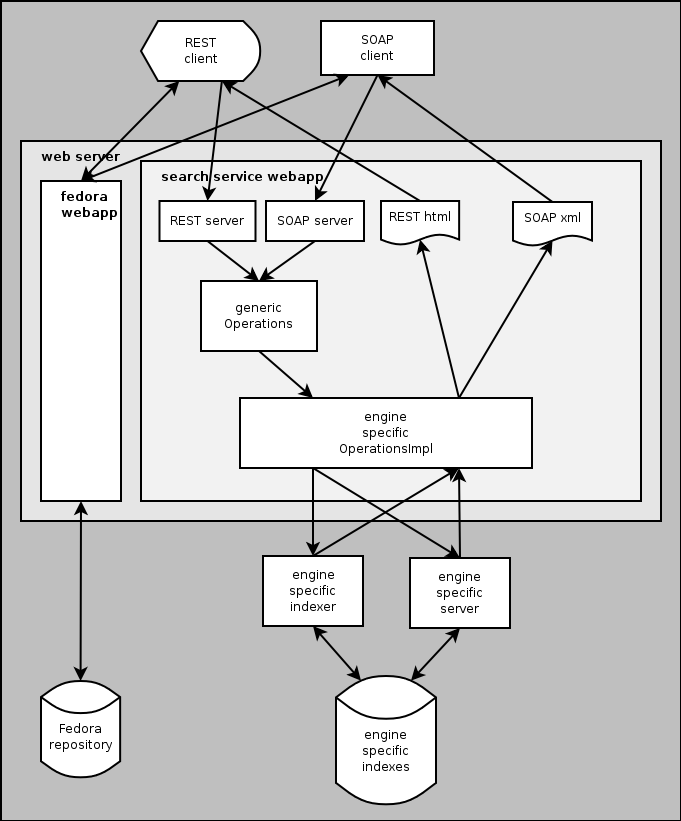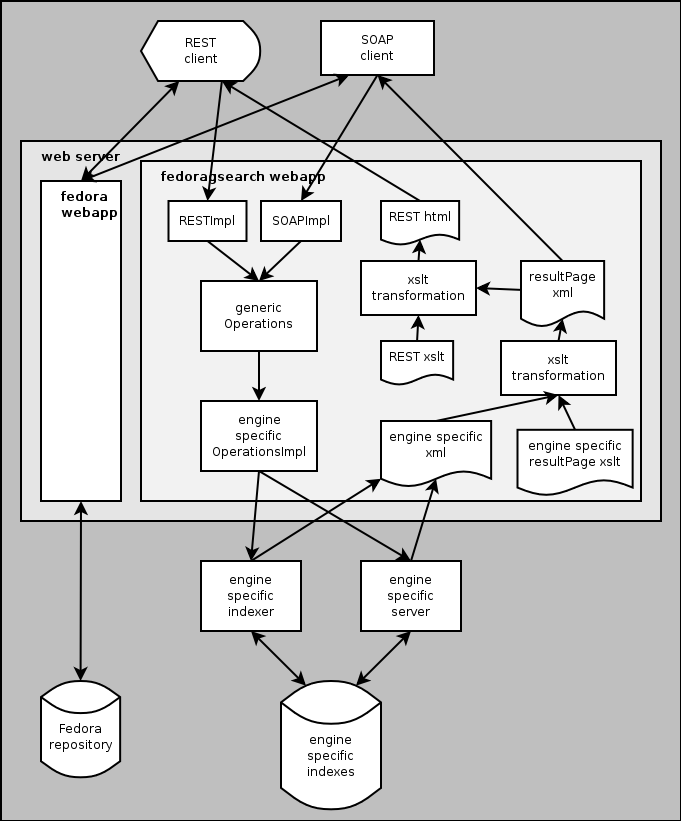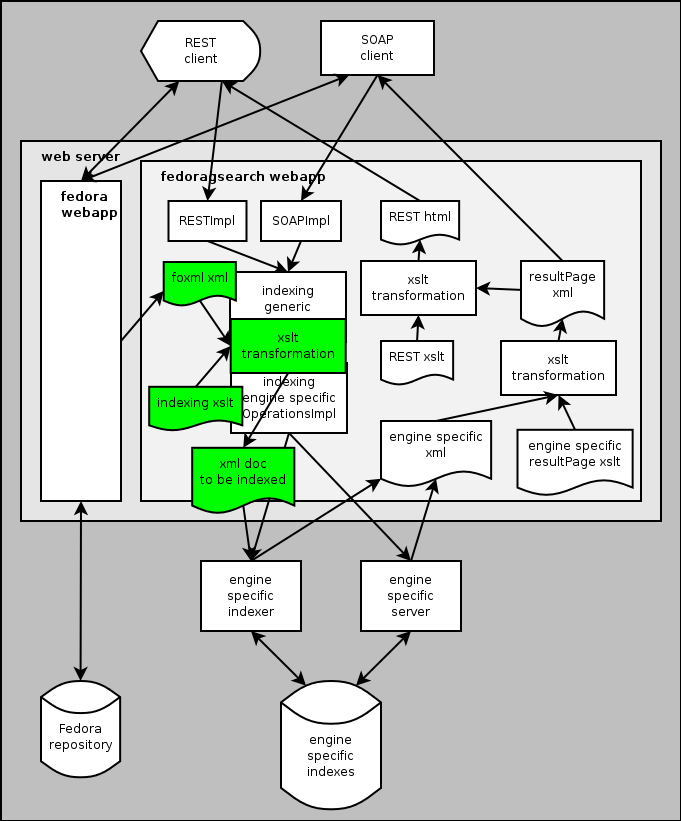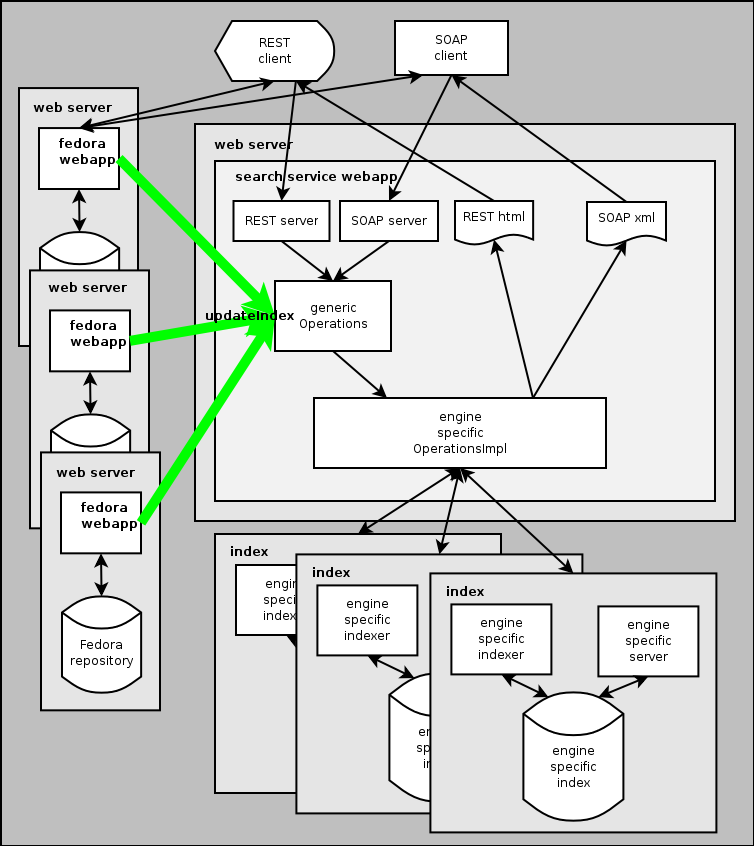This is the one-and-only documentation page for the Fedora Generic Search Service,
abbreviated fedoragsearch or GSearch.
You, the reader, are presumably responsible for or involved in making your digital contents in Fedora
searchable for your end-users. GSearch makes this task relatively easy.
GSearch comes with three plugins for top-class open-source search engines, Apache Lucene, Apache Solr, and Zebra.
Your choice of search engine plugin depends on circumstances:
- If you are one developer or a small team, you may prefer to take the easiest way, that is the Lucene plugin.
- If you want all options open, you choose the Solr plugin, where you need to know and do much more.
- The Zebra plugin is the choice that nobody has taken, because it is in a culture different from Fedora.
The choice is taken by configuration.
See a demo at your own site, almost out-of-the-box
Perform these steps:
- Create a Fedora 3.5 installation by quick install. The only piece of custom configuration needed is setting
the value of the param enabled to true for the Messaging module in fedora.fcfg:
<module role="org.fcrepo.server.messaging.Messaging" class="org.fcrepo.server.messaging.MessagingModule">
<comment>Fedora's Java Messaging Service (JMS) Module</comment>
<param name="enabled" value="true"/>
- Download fedoragsearch.war
from either the DTU prerelease site,
or from the official Duraspace site.
Alternatively, you may build fedoragsearch.war from source.
- Copy fedoragsearch.war into the tomcat webapps directory of your Fedora installation.
Tomcat will unpack it, if it is running, or else when you start it.
- Create a GSearch administrator in fedora-users.xml
<user name="fgsAdmin" password="fgsAdminPassword">
<attribute name="fedoraRole">
<value>administrator</value>
</attribute>
</user>
Notice, only users with names 'fedoraAdmin', 'fgsTester' and names starting with 'fgsAdmin'
are authorized to perform updateIndex actions.
- Create the set of configuration files.
All you need to do is edit a few of the property values
in the file webapps/fedoragsearch/FgsConfig/fgsconfig-basic.properties, including passwords,
and run
> ant -f fgsconfig-basic.xml
This ant script ends with writing the fgsconfigFinal files
to the classpath location that you have chosen.
Therefore, you need to run it with permission to write there.
- Restart tomcat.
- Now this documentation page is visible at
your own demo site.
and the admin pages are visible here:
-
- There is a
customizable end-user search client page.
See the section on Customizable end-user search client.
- Ingest the Fedora 3.5 demo objects, there are 41, 20 of them are data objects and will be indexed.
View the admin pages.
Major features
The service has the following major features:
- Indexing of Fedora FOXML records,
including the text contents of datastreams
and the results of disseminator calls.
- Search in the index.
- Plugin of selected search engines,
so far
Lucene,
Solr and
Zebra.
You are encouraged to share problems and experience with the
Fedora community, send mail to
fedora-commons-users, or to
Chris Wilper, or to
Gert Schmeltz Pedersen.
The following figure serves to give a first
understanding for a developer, who will use GSearch in a Fedora application:

The figure shows:
- A REST client, running in a user's browser, which
may combine accesses to Fedora and to GSearch.
- A SOAP client, running anywhere, may do the same.
- The Search Service implements a generic set of operations:
- updateIndex - indexing the contents of the Fedora repository.
- gfindObjects - search similar to Fedora findObjects and to the SRW/SRU operation searchRetrieve.
- browseIndex - browsing terms in a given index, similar to the SRW/SRU operation scan.
- getRepositoryInfo - describing the properties of a repository,
- getIndexInfo - describing the properties of an index.
- Engine specific implementations of the operations will receive
client requests, communicate with the engine indexer and search server,
and return the responses in the appropriate form to the clients.
GSearch may run in a separate
web server and may index more than one Fedora repository,
and it may update more than one index in parallel.
XSLT stylesheets are part of the configuration of GSearch,
and XSLT transformations play an essential role in the workflow:

-
All engine specific operations return
an engine specific xml answer, which is transformed
by an engine-specific xslt stylesheet into result page xml.
For a SOAP request this is the answer.
For a REST request this is transformed to an html answer.
There may be any number of xslt stylesheets to select from,
the default ones are selected in the properties file.
Selecting a copy stylesheet will allow the transfer
of an answer untransformed. An alternative result page format
is OpenSearch,
which is an RSS2.0 extension.
- Parameters allow clients
to select repository, index, and xslt stylesheets by name.
In a real application, these values may be determined
by the developer in the code,
or by the administrator in the properties file.
More on the updateIndex operation

- Objects in the Fedora repository are exported
in FOXML format, transformed into an appropriate
document format by the indexing stylesheet, and
indexed by the engine in question. The XML datastreams
are indexed as decided in the stylesheet.
- The following updateIndex actions are available:
- createEmpty - creating or emptying the index.
For a new index, you have to run createEmpty once, before
you can run the other actions.
- fromFoxmlFiles ( filePath ) - indexing FOXML records;
filePath may be null, in which case the configured
Fedora Object Directory is used, so that the whole
of the Fedora repository is indexed.
- fromPid ( PID ) - indexing one FOXML record,
as exported by Fedora API-M; in case a previous
index document with the same PID exists, it is first deleted.
This is the incremental update operation that shall be called after
all of Fedora's API-M operations that modifies a FedoraObject.
- deletePid ( PID ) - deleting one index document.
Search engine plugins
The Lucene plugin comes in fedoragsearch.war as the java package dk.defxws.fgslucene
together with the Apache Lucene java libraries.
The Lucene plugin is used by configuration as explained below.
Lucene has a very rich functionality, and this plugin
exploits a small fraction of it. As a java programmer, you may
have ideas for further exploitation, which you may realize
by implementing an enhanced version of the plugin.
Please, share such ideas and implementations with the Fedora community.
The Solr server is downloaded, installed and configured as described at the Solr web site.
The Solr plugin comes in fedoragsearch.war as the java package dk.defxws.fgssolr.
The Solr plugin is used by configuration as explained below.
It has dependencies on the configuration of the Solr server.
This plugin indexes documents via the HTTP POST interface of Solr.
Searches may be performed via the Solr native HTTP GET to the Solr server
and via gfindObjects, which accesses the Lucene index directly.
Solr functionality does not include browsing, however, this is offered
by the plugin via the browseIndex operation.
The Zebra plugin comes in fedoragsearch.war as the java package dk.defxws.fgszebra .
The Zebra plugin is used by configuration as
seen from FgsConfig/FgsConfigIndexTemplate/Zebra/zebraconfig, which includes a README file,
which explains how to get and install Zebra, and how to configure it.
Configuring GSearch for automatic updates
As of version 2.1, GSearch has the ability to listen to update messages
provided by Fedora. These messages are sent via JMS, so a JMS provider
must be available (a JMS provider is included with Fedora 3.0). In order
to configure the update listener, open updater.properties and set the
following property values. These values will most likely be the same
as those specified in your Fedora configuration.
-
java.naming.factory.initial
- Default: org.apache.activemq.jndi.ActiveMQInitialContextFactory
- Specifies the JNDI initial context which will be used to look up JMS administered objects.
-
java.naming.provider.url
- Default: tcp://localhost:61616
- Specifies the address at which a connection can be made to the messaging provider.
- The update listener will attempt to connect to the messaging provider at this address on server startup,
so make sure that your provider is running and available, otherwise you will see a connection error.
-
connection.factory.name
- Default: ConnectionFactory
- Specifies the JNDI name of the ConnectionFactory object needed to create a connection to the JMS
provider.
-
topic.fedoraAPIM
- Default: fedora.apim.update
- Specifies the topic on which to listen for updates.
-
client.id
- Default: fedoragsearch0
- The identifier of the GSearch client. If you have more than one instance of GSearch running
they must have different client identifiers.
If you decide not to use the automatic updates feature in GSearch, you'll need to open fedoragsearch.properties
and remove (or comment out) the line specifying fedoragsearch.updaternames. This will disable the update
listener.
Configuring Fedora for automatic updates
Fedora 3.0 added the ability to send a message whenever a change is made to the
content of the repository (through API-M.) This messaging capability must be
enabled and configured to work properly. See the Fedora documentation for
instructions on configuring messaging.
As an alternative to updates via messaging, it is possible to configure Fedora to
send a signal via REST to GSearch when objects are added, modified,
and purged. Using messaging is the preferred method for automatic updates, and this
technique, while still available, should be considered deprecated. It it not recommended
to use both the update listener and REST-based updates.
To enable REST-based updates, edit your fedora.fcfg file
and change the class of the fedora.server.storage.DOManager
module to org.fcrepo.server.storage.GSearchDOManager.
Then populate the following module parameters as needed:
-
gSearchRESTURL - The REST endpoint for
GSearch, for example, http://localhost:8080/fedoragsearch/rest
-
gSearchUsername - If GSearch is protected by
authentication, this is the username that Fedora should use to
authenticate.
-
gSearchPassword - The password for the above
user, if applicable
Multilingual configuration
Add the attribute
URIEncoding="UTF-8"
to .../tomcat/conf/server.xml
and to .../tomcat/conf/server_fedoraTemplate.xml in order to search
special characters like the Spanish "ñ",
"í" etc. (thanks to Luis Zorita).
Full-text and metadata extraction from datastreams using Apache Tika
| Parameters for getDatastreamFromTika, getDatastreamTextFromTika, and getDatastreamMetadataFromTika |
|---|
| indexFieldTagName | either "IndexField" (with the Lucene plugin) or "field" (with the Solr plugin) |
textIndexField
(not used with getDatastreamMetadataFromTika) | fieldSpec for the text index field, null or empty if not to be generated |
indexfieldnamePrefix
(not used with getDatastreamTextFromTika) | optional or empty, prefixed to the metadata index field names |
selectedFields
(not used with getDatastreamTextFromTika) | comma-separated list of metadata fieldSpecs, if empty then all fields are included with default params |
| fieldSpec | metadataFieldName [ '=' indexFieldName] [ '/' [index] [ '/' [store] [ '/' [termVector] [ '/' [boost]]]]] |
| - metadataFieldName | must be exactly as extracted by Tika from the document.
You may see the available names, if you log in debug mode
and look for "METADATA name=" under "fullDsId=" in the log, when "getFromTika" was called during updateIndex |
| - indexFieldName | is used as the generated index field name.
If not given, GSearch uses metadataFieldName after replacement of the characters ' ', ':', '/', '=', '(', ')' with '_' |
| - the following parameters are used with Lucene (with Solr these values are specified in schema.xml) |
| - index | [ 'TOKENIZED' | 'UN_TOKENIZED' ]
# first alternative is default |
| - store | [ 'YES' | 'NO' ]
# first alternative is default |
| - termVector | [ 'YES' | 'NO' ]
# first alternative is default |
| - boost | <decimal number>
# '1.0' is default |
Customizable end-user search client
The download contains the following files in webapps/fedoragsearch/ that you may customize:
- WEB-INF/classes/<configName>/rest/enduserSearchToHtml.xslt (basic page generator)
- WEB-INF/classes/<configName>/rest/fgseuBrowseTermsToHtml.xslt (browseIndex by ajax call)
- WEB-INF/classes/<configName>/rest/fgseuFacetTermsToHtml.xslt (Solr facet search by ajax call)
- WEB-INF/classes/<configName>/rest/fgseuSearchResultToHtml.xslt (gfindObjects search by ajax call)
- WEB-INF/classes/<configName>/rest/fieldsUnique.xml (see below)
- css/fgseu.css
- js/enduserSearch.js
The file fieldsUnique.xml is found in FgsConfig/indexingXsltGenerator/generatedFiles.
It has one element per index field generated from your example foxml files.
You may add, modify, and delete index field elements
to suit the needs of your end-user search client.
From the admin pages, this is the end-user search client page.
Search result filtering
Search result filtering
will show only those search hits that the user is actually permitted to read.
Three solutions have been investigated and demonstrated
and presented here.
Besides, the demonstration is included with the GSearch distribution
in .../WEB-INF/classes/configDemoSearchResultFiltering/ .
In brief, the three solutions are:
- Post-search filtering, which requires a request to the XACML mechanism for each hit,
and the total number of permitted hits is only known at the end,
a costly procedure especially when few hits are permitted out of a large number.
- In-search filtering, which requires additional index fields and query rewriting,
that is, a logical partitioning of the index.
- Pre-search filtering, which requires a physical partitioning of the index
and selection of the pertinent index at query time.
Both in-search and pre-search filtering face the challenge
of exact correspondence between the filtering mechanism and the XACML policies.
For your own purpose, in fedoragsearch.properties, you have to select
the preferred searchResultFilteringType and set the searchResultFilteringModule
to a class that you have to program, as a subclass of the demo class
dk.defxws.fedoragsearch.server.SearchResultFilteringDemoImpl
or as an implementation of the interface
dk.defxws.fedoragsearch.server.SearchResultFiltering .
Many-to-many relationship between Fedora objects and index documents
- GSearch now allows more than one index document per Fedora object, their ids are formed as <PID>'$'<suffix>, where the suffix typically is a datastream id.
- The opposite, an index document with values from more than one Fedora object, is possible by the use of the document() function of XSLT.
- A demonstration is included with the GSearch distribution
in .../WEB-INF/classes/configDemoIndexPerDS_fgs24_1019/ ..
Many-to-many relationship between repositories and indexes
- A typical application using GSearch will index one repository in one index.
However, you have the possibility to index
many repositories in one or more indexes in parallel, as shown in the image below.
- The GSearch download has an example of one repository to three indexes
in .../WEB-INF/classes/configDemoSearchResultFiltering/ .
- In general, you configure each repository and each index in the set of configuration files,
and list them in fedoragsearch.properties

Embedded queries
This is a mechanism that allows you to embed risearch queries in Lucene or Solr queries, and vice versa.
This provides interaction with the Resource Index, both when you index and when you search.
It compensates for the lack of joins in bibliographic query languages like in Lucene and Solr,
and it compensates for the lack of text search functionality in logic languages like the risearch query languages.
The full potential of this mechanism still has to be explored and realized.
These preliminary examples show some of the potential:
Building from source
Get the source from github:
git clone https://github.com/fcrepo/gsearch.git
To build fedoragsearch.war in FedoraGenericSearch/dist:
cd FedoraGenericSearch
ant buildfordownload
To build fedoragsearch.war in FedoraGenericSearch/localdist for local testing:
cd FedoraGenericSearch
ant -Dlocal.FEDORA_HOME=... -Dlocal.SOLR_HOME=... -Dlocal.SOLR_SERVER=... buildforlocaltest
To run tests, copy localdist/fedoragsearch.war into tomcat webapps
on a Fedora repository with demo objects with MessagingModule enabled.
Create a test user in fedora-users.xml
<user name="fgsTester" password="fgsTesterPassword">
<attribute name="fedoraRole">
<value>tester</value>
</attribute>
</user>
Test operations on the lucene plugin:
ant junit-lucene
ant junit-testsonlucene
ant junit-fgs23
ant junit-lucene-fgs24_1010
ant junit-lucene-fgs24_1019
Test operations on the solr plugin:
after startup of the solr server:
ant junit-solr
ant junit-solr-fgs24_1010
Test operations on the zebra plugin, install, configure and startup the zebra server:
see $FEDORA_HOME/tomcat/webapps/fedoragsearch/WEB-INF/classes/configDemoOnZebra/index/DemoOnZebra/zebraconfig/README
ant junit-zebra
New features in version 2.4
- Compatibility with Lucene 3.5 and Solr 3.5 (FCREPO-1005)
- Useful end-user search page generation from indexing stylesheet (FCREPO-1006)
- Performance measurements and possibly improvements (FCREPO-1007).
Measurements taken using Apache JMeter, on a production quality platform, giving some insight into the performance implications of various choices.
Download the report from github.
Morten Sørensen, DTU Library, is co-developer and co-author on this.
- Filtering of search results by access constraints (FCREPO-1008)
- Based on work presented at OR2008.
- Problem: Search results contain hits that the user does not have the access rights to see
- Solution: Extend access rights to search results by filtering
- Thanks to Swithun Crowe for providing a real life example
- See the section on Search result filtering.
- Interaction with the Resource Index (FCREPO-1009)
- Use of Apache Tika for full-text and metadata extraction (FCREPO-1010)
- The Apache TikaŠ toolkit extracts text and metadata from documents,
if the format is detectable by AutoDetectParser in Tika.
- In addition to the text extraction with PDFBox, GSearch now provides the following text and metadata extraction functions:
- getDatastreamTextFromTika: retrieves the text only
- getDatastreamMetadataFromTika: retrieves metadata only, also for non-text datastreams like images
- getDatastreamFromTika: retrieves both text and metadata
- See the section on Full-text and metadata extraction from datastreams.
- Thanks to Adam Soroka for the suggestion and the review.
- Management of GSearch configurations in Fedora objects (FCREPO-1018)
- Exploration of complex GSearch use cases (FCREPO-1019)
- Jonathan Green states: "... the index may not always share a 1 to 1 relationship with objects in fedora."
- GSearch now allows more than one index document per Fedora object, their ids are formed as <PID>'$'<suffix>, where the suffix in the test case is a datastream id.
- The opposite, an index document with values from more than one Fedora object, is possible by the use of the document() function of XSLT.
- See the section on Many-to-many relationship between Fedora objects and index documents.
- A typical application using GSearch will index one repository in one index.
However, you have the possibility to index
many repositories in one or more indexes in parallel,
see the section on Many-to-many relationship between repositories and indexes.
You may also
see the complete list of issues for GSearch.
New features in version 2.3
- Fedora 3.5 compatibility
- Indexing of managed xml datastreams shown with test object
- Lucene 3.4 compatibility
- Solr 3.4 compatibility
- Zebra 2.0 compatibility
- PDFBox 1.6 compatibility
- Simplified configuration with two main parts:
- Indexing stylesheet generated from example foxml files, requiring less xslt experience
- Basic properties specified in simple property file, instead of in ant script
- Selection of xslt processor, xalan or saxon, see fedoragsearch.properties
You may also
see the complete list of issues for GSearch 2.3.
New features in version 2.2
- Fedora 3.1 compatibility
- Lucene 2.4.0 compatibility
- Solr 1.3.0 compatibility
- For the lucene plugin: Search result filtering by access constraints, as defined by XACML policies,
in order to show only those search hits that the user is actually permitted to read.
Read more ....
New features in version 2.1.1
New features in version 2.1
- Fedora 3.0b2 compatibility
- Added an update listener which uses the Fedora Messaging Client to listen for
updates being performed through API-M. These update messages contain the information
needed to perform index updates, thereby keeping GSearch up-to-date with the Fedora
repository.
- Enhanced the sortFields parameter to gfindObjects for Lucene,
sorting search results by a custom Comparator class,
see the index.properties file in configTestOnLucene and
the test class dk.defxws.fedoragsearch.test.ComparatorSourceTest.
- Enhanced the fromFoxmlFiles action of updateIndex for Lucene,
so that all files are attempted to be indexed,
even though one or more may fail,
in which case log messages are given.
Before, one failure would cause abortion.
New features in version 2.0
- Added a plugin for the Apache Solr search server.
- Added easier configuration, so that you need only edit one file
with property values, then run it with ant.
- Updated to Lucene version 2.3.0.
- Added params to indexing in the format:
...&indexDocXslt=[xslt-name][(paramname1=value1[,paramname2=value2[,...]])]
Use the parameters at indexing time by putting xsl:param statement in the
indexing xslt stylesheet, like this:
<xsl:param name="someparamname" select="defaultvalue"/>
- Added optimize options for Lucene indexing:
fgsindex.mergeFactor and fgsindex.maxBufferedDocs
will affect performance, see the index.properties file in configTestOnLucene.
Also added
...?operation=updateIndex&action=optimize
which will perform IndexWriter.optimize()
which merges all segments together into a single segment,
optimizing an index for search. Removed the optimize() call after each updateIndex.
- Added untokenizedFields property to Lucene index.properties files.
Adding the property with a list of all untokenized fields will
ensure that they all select the appropriate analyzer.
- Added a sortFields parameter to gfindObjects for Lucene,
sorting search results as specified,
see the index.properties file in configTestOnLucene.
- Added properties snippetBegin and snippetEnd,
making highlight code configurable,
see the index.properties file in configTestOnLucene.
- Added property for custom URIResolver used by xslt transformers
for basic auth and SSL,
see the example dk.defxws.fedoragsearch.server.URIResolverImpl class
and the index.properties file in configTestOnLucene.
- Removed encoding of special characters in indexFields.
Snippets now show special characters without modification.
Indexes should be reindexed.
Background
The Fedora Generic Search Service, abbreviated GSearch, is part of the
Fedora Service Framework.
The primary feature of GSearch is that it makes it easy
to make your digital contents in Fedora searchable for yourself and your end-users.
GSearch was developed by
Gert Schmeltz Pedersen
at the Technical University of Denmark,
with feedback and contributions from members
of the Fedora community, including
Adam Soroka,
Alfred Heller,
Alistair Young,
Beth Kirschner,
Bill Brannan,
Binaya Poudyal,
Blake Anderson,
Boon Low,
Chris Wilper,
Christian Orthmann,
Christian Tønsberg,
Eric Brown,
Eric James,
Jonathan Green,
Jun Yamog,
Junran Lei,
Lasse Aagren,
Leire Urcelay,
Luis Zorita,
Matt Zumwalt,
Matthias Razum,
Michael Appleby,
Michael Hoppe,
Morten Sørensen,
Nikolai Schwertner,
Nilani Ganeshwaran,
Patrick Monbaron,
Pierre-Yves Landron,
Ranju Upadhyaya,
Robert Sherratt,
Roel de Cock,
Ryan E. Scherle,
Sam Liberman,
Scott Hammel,
Shunde Zhang,
Simon Lamb,
Stephen Bayliss,
Steve DiDomenico,
Stuart Chalk,
Swithun Crowe,
Thierry Michel,
and
Xinjian Guo.
The work is funded by
DEFF, Denmark's Electronic Research Library.



